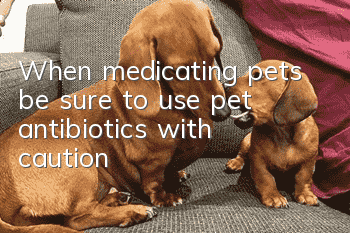When medicating pets, be sure to use pet antibiotics with caution!

When we get sick, doctors often prescribe antibiotics to help us treat the illness. Antibiotics, formerly known as antibiotics, are drugs derived from microbial metabolism or chemical synthesis that can selectively inhibit bacterial growth or kill bacteria.
At extremely low concentrations, antibiotics can inhibit and kill other microorganisms. Some antibiotics can fight viruses, tumors, parasites and other harmful substances to the body.
In addition to us, our cats, dogs and other pets will also get sick, and they will also use some antibiotics when they get sick. For example, antibiotics given to cats and dogs after surgery can prevent wound infection. Because antibiotics have significant effects on many pathogenic microorganisms, antibiotics are also chosen by more and more people.
Currently, there are four categories of antibiotic drugs commonly used in pets.
Category 1: Bactericidal drugs during the breeding period: penicillins, cephalosporins (cephalosporins), etc. Commonly used penicillins include penicillin, amoxicillin, etc.; commonly used cephalosporins include cephradine, etc.
The second category: stationary phase bactericidal drugs: such as aminoglycosides, etc. Commonly used aminoglycosides include: streptomycin sulfate, gentamicin, etc.
The third category: rapid antibacterial drugs: such as tetracyclines, macrolides, etc. Commonly used tetracycline drugs include tetracycline, etc.; commonly used macrolide drugs include spiramycin, etc.
Category 4: Slow bacteriostatic agents: such as sulfonamides, Camphora, etc.
Since pet antibiotics are very effective in treating some diseases, more and more people are using pet antibiotics, which has led to the misuse of antibiotics to treat various diseases in cats and dogs.
For example, there are many antibiotics used in dogs clinically, such as cephalexin, ampicillinna, ceftriaxone, cefquinoxime, etc. Because these antibiotics target different parts, they need to be treated according to specific requirements. Prescribe the right medicine according to the symptoms of the dog. When dogs have diarrhea and vomiting, some dog owners start buying medicines to feed their dogs based on their own symptoms.
Although antibiotics are very effective, the harm caused to pets by the misuse of antibiotics cannot be ignored.
Abuse of antibiotics can cause the following harm to pets.
1. Overuse of antibiotics is the main reason why the body develops drug resistance. As antibiotics become more effective, so do bacterial resistance. The misuse of pet antibiotics has caused the original bacteria to acquire new resistance mechanisms and transform into multi-drug-resistant bacteria, which will increase the risk of people contracting multi-drug-resistant bacterial diseases when they come into contact with pets.
2. It can easily cause damage to the dog’s liver and kidney function. For example, although penicillin and cephalosporin antibiotics currently have very little impact on the liver and kidneys, they can still have serious side effects if used inappropriately.
When using antibiotics on pets, you should strictly follow the instructions of your pet doctor. Doses vary for pets of different sizes and breedssame.
Furthermore, pets cannot be fed antibiotics and other drugs used by humans at will. Because humans, cats and dogs have different tolerances, and individual differences are also very large, so no one can estimate the effects and consequences of the drug. If given to pets, it will cause serious side effects to pets.
- What should you do if your dog has a lot of eye mucus? Learn these tips to easily help you relieve it!
- What's going on when a dog has diarrhea and foams at the mouth?
- What medicine should be used for dogs taking medicated baths?
- Causes of stillbirth in dogs
- Precautions for daily feeding of dogs
- Is it okay to neuter a male Teddy dog?
- How does a pet dog survive the dangerous period when it first arrives in a new home?
- How old can an Akita dog be to train? What should you pay attention to when training Akita dogs?
- Foreign golden retriever toilet training method
- Things that novices should pay attention to when choosing golden retriever puppies at the kennel (dog farm)



